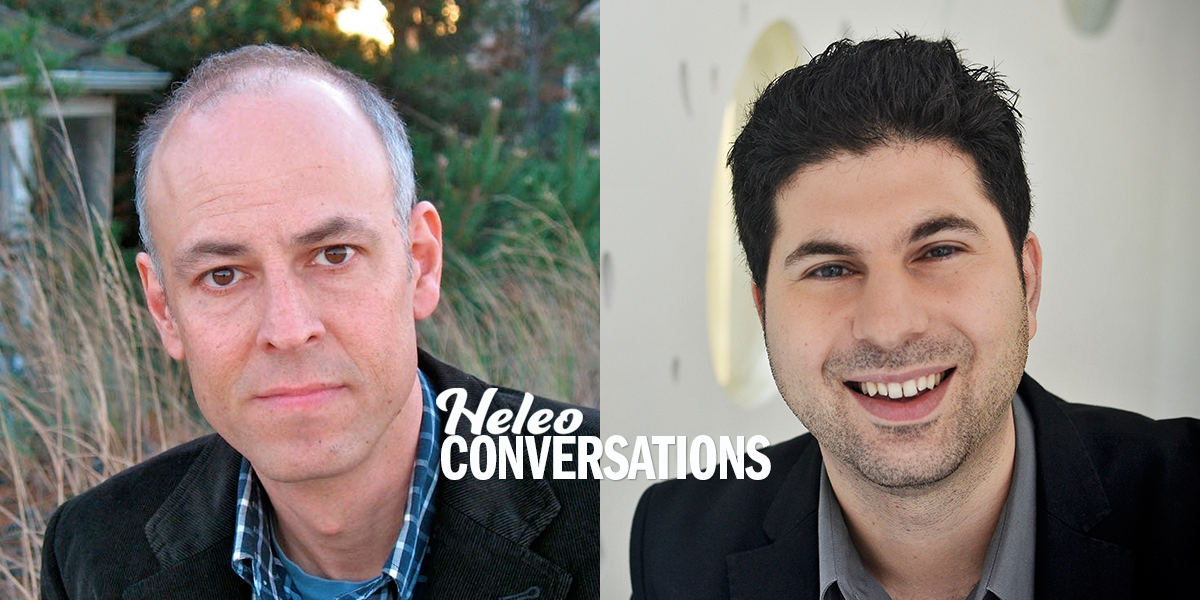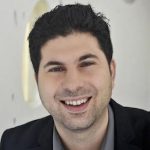Dr. Scott Barry Kaufman, professor, researcher, and author of Wired To Create: Unraveling the Mysteries of the Creative Mind, is one of the nation’s leading experts on the science of creativity. He recently sat down with journalist David Shenk to talk about persistence, our unimaginative education systems, and how everyone is capable of boosting their creativity.
David: What’s the origin of your latest book, Wired To Create?
Scott: It’s co-authored with a journalist, Carolyn Gregoire, who wrote an article called, “18 Things That Creative People Do Differently” for Huffington Post. It went viral, got millions and millions of views. She featured my work in that article, because I’ve been studying the science of creativity for the past ten years or so. We got along really well in the interview, so I thought, “Why not collaborate with her?” I wanted to write a book on the science of imagination and creativity anyway. I called her up and said, “Hey, would you like to do this book with me? I really like what you did with that article.”
It’s about the latest science of creativity and how we can all harness it in our lives for optimal well-being. There’s a focus on creativity as personal growth and how creative achievement is different than just expertise.
We talk about these habits that you find in people who live a creative lifestyle and we try to give some tips to help people develop those habits in themselves — things from being open to new experiences, to mindfulness, to having sensitivity to their environment and daydreaming and harnessing the value of solitude. Non-conformity is a big one.
David: How did you first get interested in creativity?
I do believe that everyone is capable of creative greatness.
Scott: I started off wanting to know what intelligence was. I thought my only mission in life when I was in college was to redefine human intelligence. I did my PhD dissertation on traditional metrics of intelligence, like IQ tests. When I was doing my dissertation, I realized there were low correlations between our traditional standard metrics of intelligence, and creative achievement as well as certain other personality traits and cognitive processes, like relying on your intuition and being open to new experiences. I thought that was really fascinating. I resonated more with the creative personality and the creative life than I did with living purely an intellectual life. Most people don’t want to just achieve academically their whole lives. Once they leave school they want to do more with their lives than get straight A’s. I do believe that everyone is capable of creative greatness — has it within themselves, that it can be developed. I know you agree with that idea as well — you wrote a book about it.
I think we have to be careful about just saying “only these people have it, these people don’t have it,” because creativity seems to be something that comes from self expression. It’s a very intrinsically driven way of being, or way of relating to your world. It’s something that will only flourish under intrinsic conditions. Whereas intelligence doesn’t only require intrinsic conditions to flourish. We can force people to do well on standardized tests and SAT scores, and they’ll do better because of the external requirements. Creativity is a different beast.
Trending: Best Happiness Books of 2025 (So Far)
David: You’ve been studying creativity for ten years and obviously have a lot to say about it. Is the gist of what you’re saying to people in this book, “Hey, you may not think you can be creative but it’s like a muscle, you can develop it”?
Scott: Great question. As a scientist I have trouble distilling anything into one sentence. I know in the world at large it’s good to do that.
People differ in how creative they are in their lives, how much they’ve achieved creatively. We wanted to mine the habits of those highly creative people so we could give that information to everyone. We do believe that everyone is capable of developing creativity and can make an active choice to change their lifestyle and strengthen these habits of highly creative people.
David: In your book you reference the British social psychologist Graham Wallas. He has this old four stage model of creativity and I think one of your big points is that his theory was very clean and organized — from one stage to the next, to the next, to the next — but it’s a much messier process than that.
Scott: I think we don’t appreciate messy minds or messy processes. In school we hardly give any time for revisions or for people to actually incorporate feedback and to just have the time and process to discover something. They’re so focused on these tests.
Trending: Why Rest is the Biggest Productivity Hack for Your Brain
Creativity operates not as an efficient process but through a lot of trial and error; through a lot of mixing and matching seemingly contradictory personality traits and getting to really experience the full you–both your positive and negative emotions; going through set-backs and then trying to overcome them. We just do a terrible job in school of stimulating the creative process and allowing people to actually go through it, and say, look we appreciate this messiness of this process, and we appreciate that you’re learning from all this.
David: Where do you go then from that observation? Should one cultivate the messiness or is it just enough to understand it and be aware of it?
Scott: Once you’re aware of the process a lot of these creative people went through and you realize just how non-linear it was, it should be empowering for anyone to set out on a goal, to be flexible and adaptable when problems arise and when hardships occur. To try and seek out different paths or to go different directions. I think that what we can learn from these great creators, and the messiness of their process is actually quite inspiring.
David: What if anything has most surprised you about your research into creativity? Is there something that has changed the way you think of creativity?
Scott: As a person who felt like I wasn’t appreciated for my creativity in school and my imagination and my daydreaming, the research has, in a lot of ways, just born out what I’ve intuitively felt is the case. It further confirms one of the missions I have in life, which is to show that a lot of the things that we think we should be developing in children because they will make them successful and happy people are quite at odds with the actual traits that we should be appreciating and cultivating in people.
If you’re not naturally gifted in something, and you don’t particularly have an interest in it, so what? Move on to something else. Life is short.
David: What advice do you have for people who want to spend a portion of their life being creative but don’t feel like they have a natural gift? Is there a way they can get some more creative juice?
Trending: How to Break Free From the Ambition Trap
Scott: There are so many things on offer in this world, so many ways that one can create meaning out of their lives, and create purpose. I don’t know why we need to encourage people to keep trying if they’re not interested in something, or it doesn’t come naturally to them. I think a major focus of school should be self-exploration, what really gives you meaning in life, what really cuts to the core of your being.
We’re not all naturally gifted in everything. If you’re not naturally gifted in something, and you don’t particularly have an interest in it, so what? Move on to something else. Life is short. I think we should work on cultivating the things that give us the greatest meaning.
Angela Duckworth and I talk about talent as the rate of development in learning something, given the same amount of effort that other people might put in. We all get more bang for the buck out of certain things. But I think the point of life is more than giftedness; it’s where our life experiences, our interests, our inclinations, our tendencies, our personality, and a cause or something in the world on which we can really make an impact all intersect. When there’s a great match among all of these factors, I think that’s when we should specifically say, go for it.
When I was a kid I wanted to be in the NBA. I had an interest in that, and I practiced a lot. Then I started playing with Kobe Bryant, who came to our middle school, and he was just like a whole different being. The difference between Kobe Bryant and me is not just that he practiced more. There’s kind of a different beast there. And that that’s a very extreme example, but there are so many things in our lives where it may not come easily to us, and that’s OK. We don’t have to always be in a competition mindset.
There are an awful lot of things in life where you can take yourself out of that competition mindset, and just purely stay on your own road. “This is my path, this gives me a lot of meaning, I’m very interested in this, and I’m not here to out-compete others in this.” When you shift to that mode of thinking, you realize that all these arguments about talent vs practice are just not relevant anymore.




























